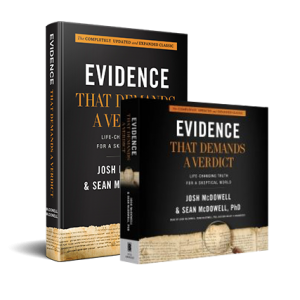The accuracy of history is critical. Even for Christianity.
We can look at this photo and make some subjective judgments. We might deduce that the child is somewhere cold. We might also suggest the child’s age, if not also his or her nationality, healthiness, and socioeconomic status. In effect, we’re self-determining this child’s history.
Historians, too, might start with a single photo in their attempt to piece together some aspect of the past. The question we should ask upon their completed puzzle is, “Did they get it right? Is their version of history reliable — or skewed by subjectivity?”

Questioning History
It’s a valid question, as history has a history of being written or adjusted to match a personal bias. Both Hitler and Stalin, for example, revised “history” to justify their politics. Tweaking of history is a common practice; too often we don’t realize that its telling lacks truth or objectivity. Ask American adults, for example, what caused the Civil War, and their replies might overwhelmingly point to whether they were educated in the North or the South.
In this post, let’s look at the burden that rests on historians, including some of the criteria they should employ as they determine historical “truth.” Here’s the Cliff’s Notes version of this post: History isn’t true “history” unless its facts are presented objectively. Otherwise it’s skewed storytelling, if not outright propaganda.
Religion is one area in which truthful, objective history is critical to distinguish between fact and fiction, myth, and legend. Christianity makes historical claims that historians continue to study exhaustively. Some scholars do a great job of being objective; others are unable to get past their personal biases.
History Demands Objectivity
“A historian,” writes historian David Fischer, author of Historians’ Fallacies, “is someone (anyone) who asks an open-ended question about past events and answers it with selected facts which are arranged in the form of an explanatory paradigm.” In short, asserts Fischer, history is a problem-solving discipline. So a historian might ask, “Was Jesus was a real, historical person?” (Here an atheist says no, countered by a pro-Christ response.)
Fischer suggests the following seven rules should guide a historian’s methodology:
1.) Historical evidence must a direct answer to the question asked and not some other question.
2.) The historian must provide not just good evidence, but the best relevant evidence.
3.) This evidence must always be affirmative.
4.) The meaning of any empirical statement depends upon the context from which it is taken.
5.) An empirical statement must not be more precise that its evidence warrants.
6.) The historian must best determine the probability of A in relation to the probability of alternatives. As historian Richard Evans notes, “No historian really believes in the absolute truth of what they are writing, simply in its probable truth, which they have done their utmost to establish by following the usual rules of evidence.”
7.) The burden of proof rests upon its author.
Apologist and historian Michael Licona suggests six additional guidelines for the historian, in order to minimize bias and horizon (worldview) and arrive at the most accurate judgment possible:
1.) Pay close attention to historical methodology, including how competing hypotheses are compared and tested, and the manner in which data is collected, analyzed, and contextualized.
2.) The historian’s horizon and method should be public. He should be clear about his guiding presumptions.
3.) Employ peer pressure. Peer critique and analysis can help minimize and check bias.
4.) Submit ideas to unsympathetic (critical) experts for review and feedback to help gain accurate conclusions.
5.) Account for the relevant historical bedrock. Some facts are so firmly established, that any reputable theory must be incorporated or built upon them.
6.) Historians must detach from their biases. They must willingly confront data and arguments that run contrary to their preferred hypothesis.
The Bias of Relativism, Revisionism, and Subjectivity
If objectivity is critical to discerning truth, why are historians often willing to slide into subjectivity, relativism, and revisionism? In part because of the influence of noted philosophers David Hume and Immanuel Kant, as well as historian Charles A. Beard.
Hume (1711-1776) taught that reality isn’t provable, so one should be skeptical of rational claims of knowledge. Immanuel Kant (1724-1804) argued that the only world knowable is the world we create within our minds. In other words, what’s important is how our minds understand and interpret things, not the way things really are. Beard (1874-1948), heavily influenced by both thinkers, asserted that we can’t expect to know, with certainty, that a historical event actually happened.
Let’s look at Beard’s objections to the “knowability” of history:
1.) History is not directly observable. Beard contends, “The historian is not an observer of the path that lies beyond. He cannot see it objectively as the chemist sees his test tubes and compounds.” Beard is saying that, because historians didn’t see an event for themselves, they can only subjectively view it through the lens of others.
Rebuttal: That’s interesting, given that The Big Bang was theorized by scientists based on evidence without direct access to its occurrence. Noted contemporary philosopher Lane Craig reminds us that it is “naive to think that the scientist always has direct access to his objects of study,” especially in highly theoretical fields like physics. Historians need not be held to this standard, when archeological data amply furnishes historians with direct access to the past.
2.) The fragmentary nature of historical accounts. Asserts Beard, “The documentation (including monuments and other relics) with which the historian must work covers only a part of the events and personalities that make up the actuality of history,” so therefore a historian can’t make final conclusions.
Rebuttal: Licona pushes back on this. “If we think of history as an exhaustive description of the past, then history is certainly unknowable,” he says. “However, if we regard history as an adequate description of a subject during a specific period, we are in a position to think that history is knowable to a degree. Although incomplete, adequate descriptions provide enough data for answering the questions being asked.” Fischer adds that the suggestion that a historian can’t know anything until he know everything is both impossible and absurd. Science certainly doesn’t hold itself to that standard. Scientists use fossil remains, which represent but a tiny percentage of past life, to reconstruct an objective picture of geological history. Dinosaurs, anyone?
3.) The problem of selection of documentation. Beard says, “Not only is the documentation partial, in very few cases can the historian be reasonably sure that he has assembled all the documents of a given period, region, or segment.” The selectivity in methodology, he asserts, renders history nonobjective.
Rebuttal: Yet, as contemporary philosopher Norman Geisler reminds us, jurors, in courtrooms every day, make judgments “beyond reasonable doubt” without having all the evidence. He adds that if the historian has the relevant and crucial evidence, it is sufficient to obtain objectivity.
4.) Every historian is a product of his time and worldview. Asserts Beard, “Whatever acts of purification the historian may perform he yet remains human, a creature of time, place, circumstance, interests, predilections, culture.”
Rebuttal: But just because the historian is a product of his time, it does not follow that his history is also a product of the time. Geisler notes that this confuses the content of knowledge and the process of attaining it. It confuses the formation of the view with its verification. Fischer gives us this example: “An American historian may chauvinistically assert that the United States declared its independence from England in 1776. That statement is true, no matter what the motives of its maker may have been. On the other hand, an English historian may patriotically insist that England declare its independence from the United States in 1776. That assertion is false, and always will be.”
5.) The historian can’t avoid value judgments. Beard writes, “Into the selection of topics, the choice and arrangement of materials, the specific historian’s ‘me’ will enter.” So Beard concludes, “The historian’s powers are limited. He may search for, but he cannot find ‘objective truth’ of history, or write it, ‘as it actually was.'”
Rebuttal: As N.T. Wright notes, “The fact that somebody, standing somewhere, with a particular point of view, is knowing something does not mean that the knowledge is less valuable: merely that it is precisely knowledge. … It must be asserted most strongly that to discover that a particular writer has a ‘bias’ tells us nothing whatever about the value of the information he or she presents. It merely bids us be aware of the bias (and our on, for that matter) and to assess the material according to as many sources as we can.”
Philosopher Mortimer J. Adler put forth that there’s a difference between self-evident truths and historical knowledge: “On the one hand we have self-evident truths that have certitude and incorrigibility; and we also have truths that are still subject to doubt but that are supported by evidence and reason to a degree that puts them beyond reasonable doubt or at least gives them predominance over contrary views. All else is mere opinion — with no claim to be knowledge or having any hold on truth.”
Implications for Christianity
Many skeptics and historians claim that there is no historical proof for Jesus or His resurrection outside of the Bible. Some disregard Christianity’s historical credibility because they find its historians biased, which is a really wonky argument for the New Testament, whose authors spent a lot of time reminding readers of facts and eyewitnesses that validated their claims about Jesus.
These skeptics also reject the Bible because it embodies the miraculous. The Red Sea parting? Impossible. Jesus walking on water? Impossible. Jesus resurrected as Lord? Impossible! Miracles are a theological construct, they assert, not a historical one, so the Bible holds no authority for objective study.
But we can logically assume that if a historian flat out refuses to acknowledge the possibility of the miraculous, that even if biblical miracles were repeated before their very eyes they would refuse to abandon their anti-miracle bias. If, like Hume, a person believes miracles to be logically impossible, then admitting a miracle becomes impossible for that person. In effect, they box themselves in, in order to hold onto their view. But it should matter more to arrive at the truth, right?
Historical Truth is Knowable
Hume, Kant, and Beard would have us believe that nothing is knowable. Well, I suppose we can debate their arguments until cows start milking themselves. But in the real world, their arguments simply don’t hold up. Real truth can be discovered and known, if we seek and test it objectively. Too, we don’t have to know everything about an event, as Beard asserts, to know that it did, in fact, happen. Common sense and real-world experience affirm this, even if philosophical pondering leads us to question even the possibility of reality or objective truth.
Hume, Kant, and Beard are wrong about the impossibility of knowing historical truth. There are very good reasons to conclude that careful historians can make accurate assessments of the past, including events considered miraculous.

This blog post highlights Josh and Sean McDowell’s recently revised apologetics classic, Evidence That Demands a Verdict. We are certain this fully updated and expanded resource will be an effective evangelism tool for you, and strengthen your faith by answering the toughest questions tossed to you by skeptics. Know what you know, because it’s true. But share this truth with LOVE!
If you’d like to start from the first blog post in this series, click here: Apologetics: Apologizing for Believing in God?.



